Daily Vocabulary Words: List of Daily Used Words
Hi there. Welcome to this special section @ Wordpandit.
Our endeavour here is straightforward: highlighting important daily vocabulary words, you would encounter in The Hindu. This is your repository of commonly used words; essentially, we are posting a list of daily used words. Hence, this has significant practical application as it teaches you words that are commonly used in a leading publication such as The Hindu.
Visit the website daily to learn words from The Hindu.
WORD-1: Duped
CONTEXT: Many of them were duped by online video advertisements that promised “safe jobs” with the military far from the frontlines, even indicating more lucrative jobs in the neighbouring European Schengen States.
SOURCE: The Hindu
EXPLANATORY PARAGRAPH: Imagine someone tells you they’re going to give you a big, delicious chocolate bar, but instead, they give you a plastic one that’s not real. You thought you were getting chocolate, but it was just pretend. That’s being “duped.” It means someone tricked you into believing something that wasn’t true.
MEANING: To be deceived or tricked by someone into believing something that is not true (verb).
PRONUNCIATION: dooped
SYNONYMS: tricked, deceived, fooled, misled, hoodwinked, bamboozled, conned
USAGE EXAMPLES:
1. The magician duped the audience into thinking he had disappeared.
2. She felt duped when she found out the diamond was fake.
3. The email looked real, but it was actually a scam to dupe people out of money.
4. He was duped into signing a contract that wasn’t in his favor.
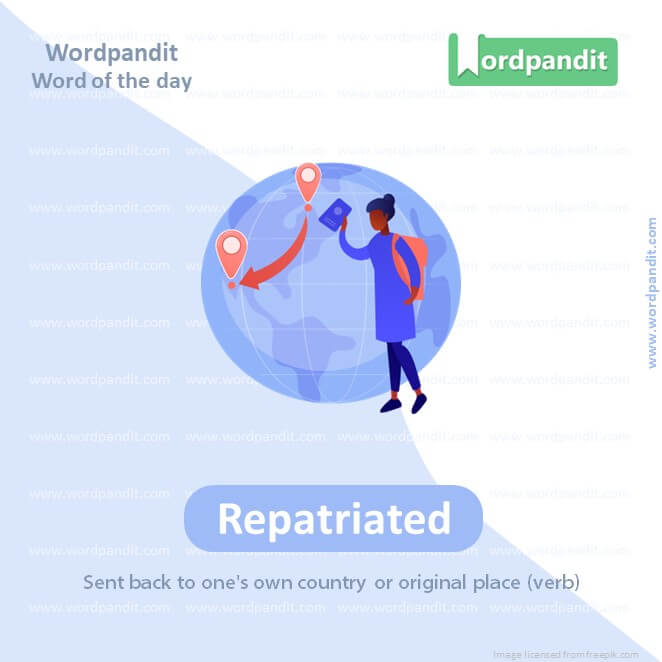
WORD-2: Repatriated
CONTEXT: The government’s actions are much delayed and cold comfort to the families of the two men, from Surat and from Hyderabad, whose bodies are yet to be repatriated.
SOURCE: The Hindu
EXPLANATORY PARAGRAPH: Imagine if you had a toy that you took to your friend’s house, but then your friend brought it back to your home because it belongs to you. When your toy comes back to where it lives, it’s like being “repatriated.” It means someone or something is returned back to their own country or place where they belong.
MEANING: Sent back to one’s own country or original place (verb)
PRONUNCIATION: reh-PAY-tree-ay-ted
SYNONYMS: returned, sent back, restored, brought back, reinstated, reestablished
USAGE EXAMPLES:
1. The government worked to repatriate citizens stranded abroad during the lockdown.
2. Ancient artifacts were repatriated to their country of origin.
3. Soldiers were repatriated after the war ended.
4. The zoo repatriated the wild animals to their natural habitats.
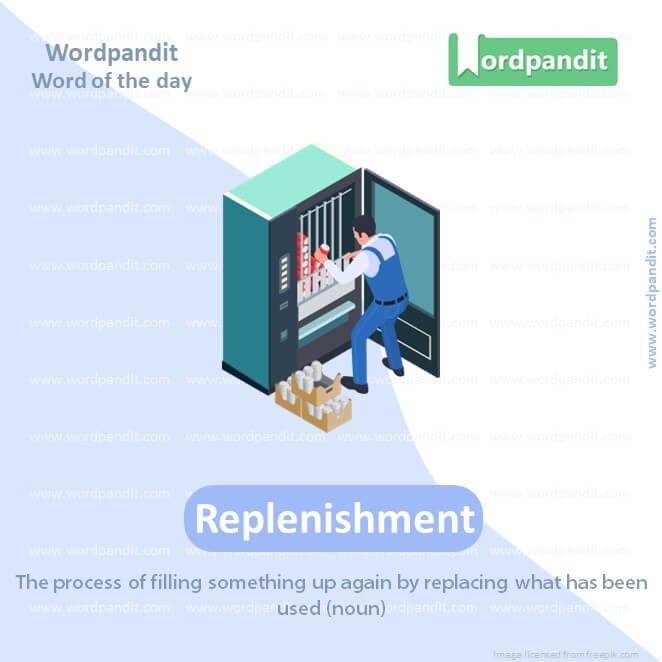
WORD-3: Replenishment
CONTEXT: Reports have suggested that the distal cause is the ‘insufficient’ rainfall last year, following the surplus in 2022, and the resulting under-‘replenishment’ of the Cauvery.
SOURCE: The Hindu
EXPLANATORY PARAGRAPH: Imagine your glass of water is empty, and you fill it up again so you can drink more. That filling up is like “replenishment.” It means adding more of something to replace what was used up, so there’s enough again.
MEANING: The process of filling something up again by replacing what has been used (noun).
PRONUNCIATION: reh-PLEN-ish-ment
SYNONYMS: refill, restoration, renewal, resupply, restocking, topping up
USAGE EXAMPLES:
1. After the long run, the runner looked forward to the replenishment of his water bottle.
2. The garden needed replenishment with new plants in the spring.
3. The store’s inventory required frequent replenishment during the holiday season.
4. The replenishment of the food supplies was essential for the campers.
WORD-4: Concretisation
CONTEXT: Seasonal lakes have since dwindled, while perennial lakes have been strangled by concretisation and sewage.
SOURCE: The Hindu
EXPLANATORY PARAGRAPH: Imagine you have a bunch of ideas for building a cool castle out of blocks. When you start putting the blocks together, making the castle for real, that’s like “concretisation.” It means taking ideas or plans and making them into something you can see and touch.
MEANING: The process of making an idea, plan, or intention clear and definite (noun).
PRONUNCIATION: kon-kreet-ih-ZAY-shun
SYNONYMS: materialization, realization, embodiment, manifestation, actualization, substantiation
USAGE EXAMPLES:
1. The architect’s dream saw concretisation through the building’s completion.
2. The policy’s concretisation was evident in the newly implemented laws.
3. After months of planning, the event’s concretisation was a success.
4. Her vision for the garden found concretisation in the vibrant flowers and designs.
WORD-5: Festering
CONTEXT: It precipitates non-linear changes that lead to disproportionate, and sometimes irreversible, outcomes, forcing underprepared governments to mount rapid responses to forces that have been festering for decades.
SOURCE: The Hindu
EXPLANATORY PARAGRAPH: Imagine you have a small cut on your hand, and instead of cleaning it and putting a bandage on it, you forget about it. After some days, you see it’s not healing and looks worse, like it’s angry and more hurt. That’s what happens when something is festering; it’s getting more and more upset or bad because it’s not taken care of.
MEANING: The process of becoming worse or more intense, especially due to neglect or failure to resolve a problem (verb).
PRONUNCIATION: FES-ter-ing
SYNONYMS: Rotting, Souring, Worsening, Deteriorating, Decaying, Putrefying
USAGE EXAMPLES:
1. The wound on his leg was festering because he didn’t clean it properly.
2. Their argument left festering feelings of resentment.
3. The trash in the alley started festering in the summer heat.
4. The unresolved issues in their relationship were festering into a bigger problem.
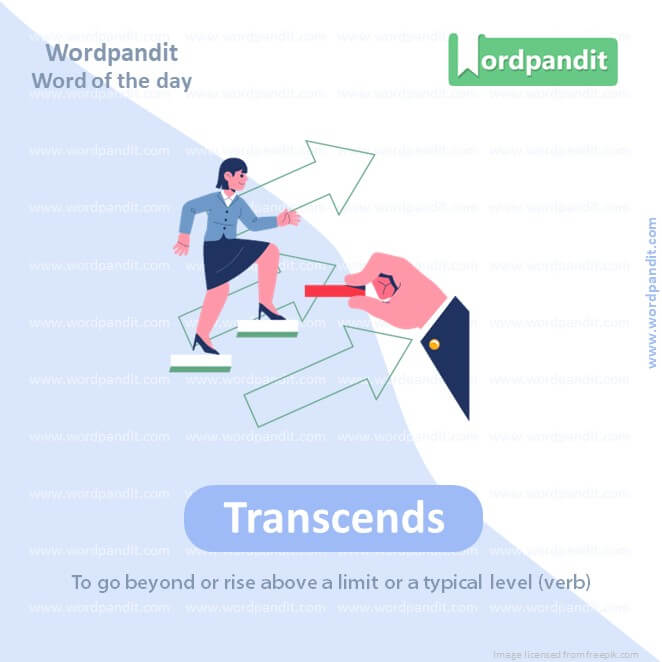
WORD-6: Transcend
CONTEXT: There is a need for bipartisan solutions that transcend the change in government every five years; a circular water economy that maximises the utility of every litre, reducing the city’s dependence on external sources; and, not to forget, a clean and healthy Cauvery.
SOURCE: The Hindu
EXPLANATORY PARAGRAPH: Imagine you have a really high wall in front of you that you think you can’t climb over. But then you use a ladder and easily go over the wall. When you do something like this, going beyond what you thought was possible, it’s like transcending. It means you are doing better or going higher than what was expected.
MEANING: To go beyond or rise above a limit or a typical level (verb)
PRONUNCIATION: tran-SEND
SYNONYMS: Surpass, Exceed, Outstrip, Eclipse, Outdo, Overcome
USAGE EXAMPLES:
1. She transcended her own expectations by winning the race.
2. The new technology transcends anything we’ve seen before.
3. His kindness and generosity transcend all cultural boundaries.
4. The artist’s work transcends the normal boundaries of painting and sculpture.
WORD-7: Opaque
CONTEXT: it is the opaque nature of most of the donations coupled with the distribution of cash for votes that weakens the process of free and fair elections in India.
SOURCE: The Hindu
EXPLANATORY PARAGRAPH: Imagine you have a window that you cannot see through because it’s covered with a lot of paint. This means light can’t get through it, and you can’t see what’s on the other side. When something is like this, not clear or see-through, we say it’s opaque.
MEANING: Not able to be seen through; not transparent (adjective).
PRONUNCIATION: oh-PAKE
SYNONYMS: Cloudy, Murky, Obscure, Non-transparent, Foggy, Blurry
USAGE EXAMPLES:
1. The bathroom window is made of opaque glass for privacy.
2. The instructions were opaque and difficult to understand.
3. The liquid turned opaque after adding the chemical.
4. The curtains were thick and opaque, blocking all the sunlight.
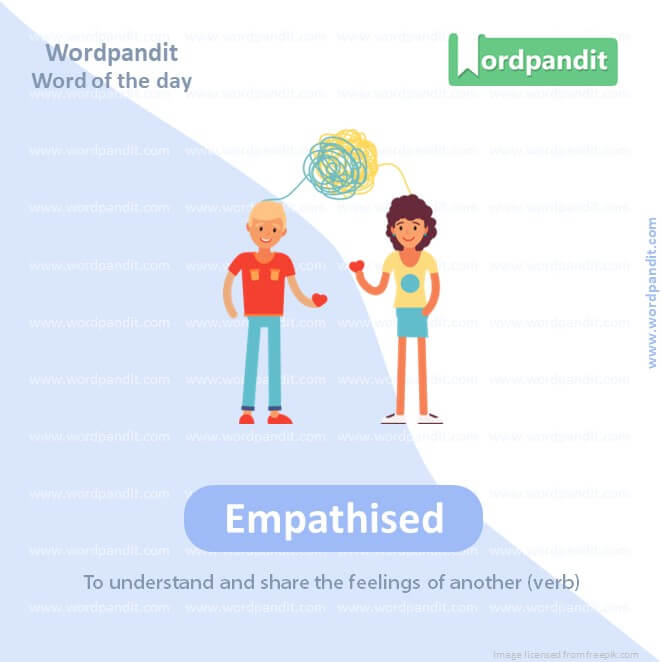
WORD-8: Empathised
CONTEXT: He empathised with the “woeful plight” of the thousands of young people, who, he said, had been let down by the Telugu Desam Party (TDP) government which had released a DSC (District Selection Committee) notification to fill 7,000 teacher posts against the 23,000 vacant posts in the State.
SOURCE: The Hindu
EXPLANATORY PARAGRAPH: Imagine your friend is sad because they lost their favorite toy. You remember how sad you felt when you lost your toy, and because of that, you understand exactly how your friend feels. You’re sharing their feelings. That’s what it means to empathise with someone.
MEANING: To understand and share the feelings of another (verb).
PRONUNCIATION: EM-puh-thized
SYNONYMS: Sympathize, Understand, Relate to, Share feelings, Connect with, Identify with
USAGE EXAMPLES:
1. She empathised with her friend’s struggle because she had faced similar challenges.
2. The teacher empathised with the students’ frustration over the difficult assignment.
3. After listening to his story, I could really empathise with his situation.
4. The movie made me empathise with the characters’ journey and struggles.
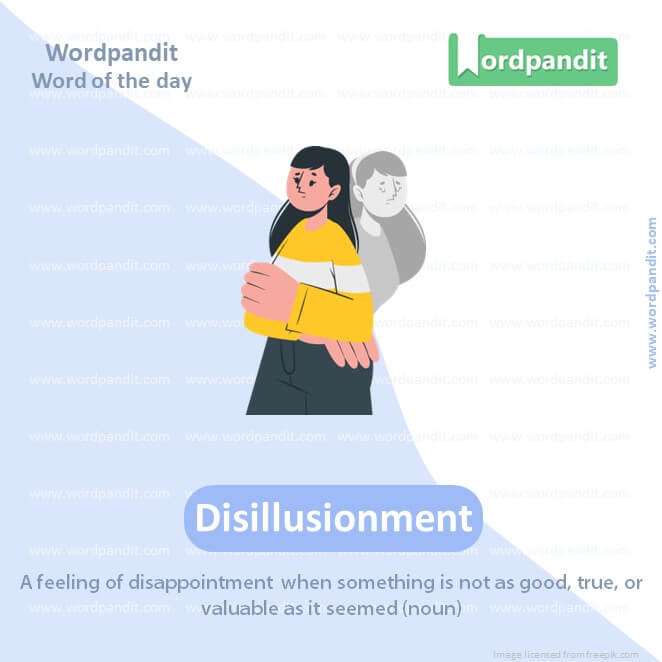
WORD-9: Disillusionment
CONTEXT: there is growing disillusionment from other quarters.
SOURCE: The Hindu
EXPLANATORY PARAGRAPH: Imagine you believe that there’s a fairy who makes the flowers grow. But one day, you learn it’s actually the water and sun that help flowers grow, not a fairy. You might feel a bit sad because what you believed before wasn’t true. This feeling of being sad or let down when you find out the truth is called disillusionment.
MEANING: A feeling of disappointment when something is not as good, true, or valuable as it seemed (noun)
PRONUNCIATION: dis-il-loo-zhuhn-ment
SYNONYMS: Disappointment, Disenchantment, Letdown, Dismay, Discontent, Disheartenment
USAGE EXAMPLES:
1. There was a sense of disillusionment among the team when they lost the game.
2. After learning the truth, she felt a deep disillusionment with her idol.
3. The disillusionment with the government’s promises grew among the citizens.
4. His disillusionment was apparent when he spoke about his former job.
WORD-10: Encashment
CONTEXT: SBI must disclose details of each Electoral Bond encashed by political parties which shall include the date of encashment and the denomination of the Electoral Bond”.
SOURCE: The Hindu
EXPLANATORY PARAGRAPH: Imagine you have a gift card to buy toys, but instead of using it at the store, you decide to exchange it for actual money. When you do this exchange, it’s like turning something that’s not money into money. This act of exchanging for money is what we call encashment.
MEANING: The process of converting a financial instrument into cash (noun)
PRONUNCIATION: en-KASH-ment
SYNONYMS: Liquidation, Cashing in, Realization, Conversion, Redemption, Withdrawal
USAGE EXAMPLES:
1. The encashment of the cheque took a few days to process.
2. She decided on the encashment of her bonds to pay for the trip.
3. The policy allows for early encashment with some penalties.
4. After his retirement, he went through the encashment of his savings bonds.
Vocabulary Meaning
In the ocean of language learning, ‘vocabulary meaning’ is akin to the colorful coral reefs that add depth and vibrancy to communication. Yet, infusing our interactions with this vibrancy is often a challenge for many language learners. The crux lies in effectively deciphering and employing the ‘vocabulary meaning’.
Learning ‘vocabulary meaning’ isn’t about merely gluing words to their definitions. It’s about forming a deep understanding and connection with these words that transcends rote learning. To gain a comprehensive grasp of ‘vocabulary meaning’, one needs to navigate beyond textbook definitions and commit to exploiting diversified resources such as novels, films, music, articles, and digital content. This allows one to encounter vocabulary in a variety of contexts and actual usage, giving deeper insight into their meaning.
However, understanding ‘vocabulary meaning’ involves another essential aspect—memory retention. Techniques such as spaced repetition and the Leitner System offer effective methodologies to maintain and consolidate the ‘vocabulary meaning’. Additionally, leveraging mnemonic strategies can help etch words into your memory by linking them with unique stories or imagery that are personal and easily recallable.
Another way of mastering ‘vocabulary meaning’ is by immersing yourself in the language. Engage in regular conversations with native speakers if possible or utilize language exchange platforms to practice your skills. This not only bolsters your understanding of how the vocabulary is used but also helps articulate the ‘vocabulary meaning’ in the societal and cultural contexts.
In conclusion, gaining a robust grasp of ‘vocabulary meaning’ is a journey rather than an end goal. It requires dedication, perseverance and most importantly, a multi-faceted approach that includes diversified resources, effective memory strategies, and real-life application. With these strategies in place, the depths of ‘vocabulary meaning’ are no longer daunting but become an enchanting exploration of language.










